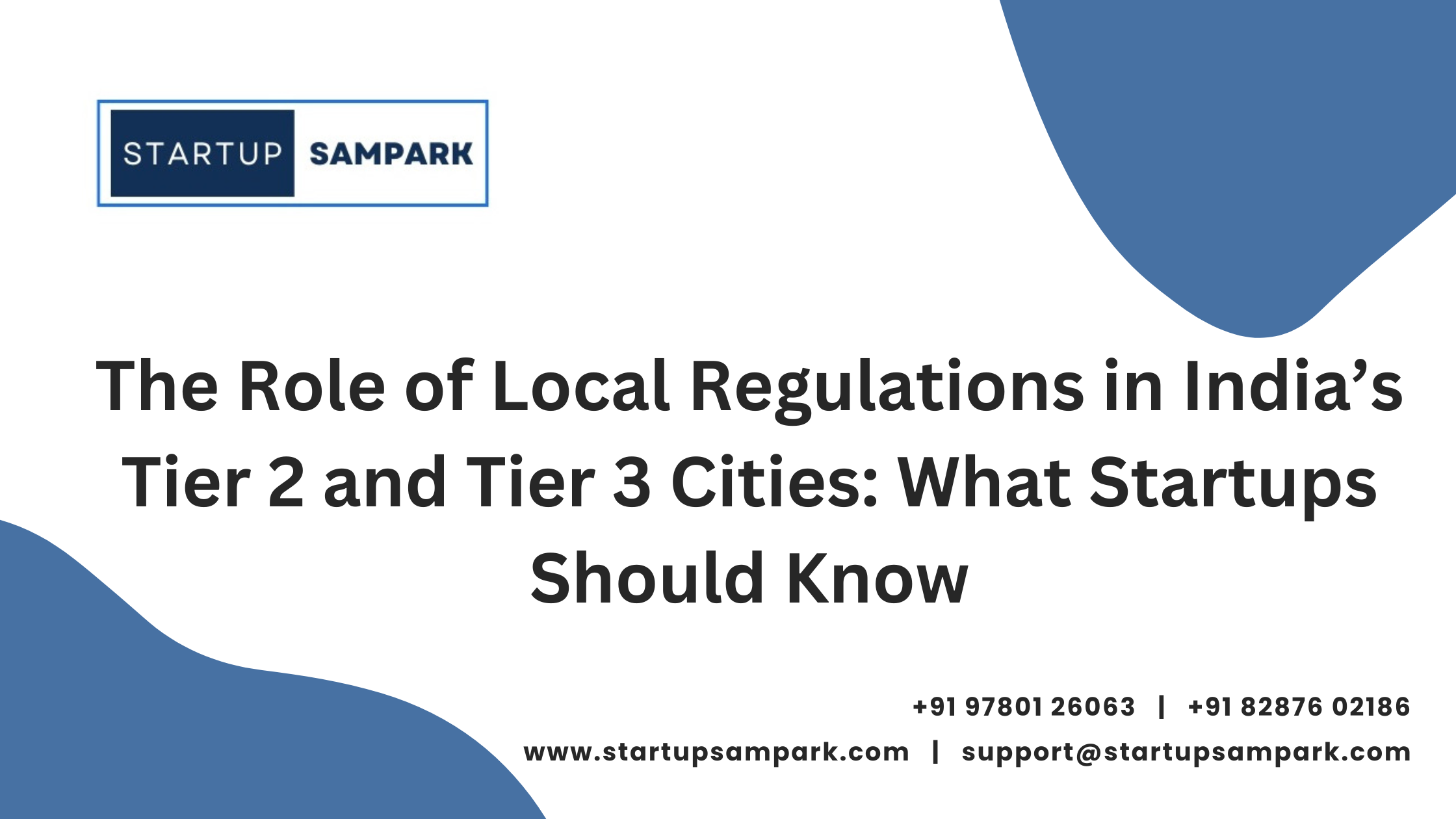The Role of Local Regulations in India’s Tier 2 and Tier 3 Cities: What Startups Should Know
Introduction
India’s Tier 2 and Tier 3 cities have emerged as fertile grounds for startup growth, with increasing consumer demand, lower operational costs, and supportive government initiatives. Startups are increasingly exploring these cities to tap into new markets, reduce operating expenses, and access emerging talent pools. However, local regulations in these smaller cities often differ significantly from those in metro areas, affecting how businesses operate, comply with local laws, and navigate unique challenges. Understanding these regulations is crucial for startups to effectively establish a presence and leverage the distinct advantages of Tier 2 and Tier 3 cities.
Compliance with Local Labor Laws and Employment Regulations
Local labor laws and employment regulations in Tier 2 and Tier 3 cities can vary widely, affecting the way startups manage their workforce. While businesses in these cities benefit from lower wage costs, they are still required to adhere to specific labor laws under the Shops and Establishments Act or relevant state-specific labor laws. These regulations address working hours, employee benefits, health and safety standards, and record-keeping requirements. Startups must remain aware of regional labor rules to ensure compliance and foster a positive work environment. Staying updated with these regulations helps prevent potential disputes and strengthens the business’s reputation as a fair and compliant employer.
-
 Startup Registration (DPIIT Recognition)₹8,850.00
Startup Registration (DPIIT Recognition)₹8,850.00
Licensing and Permit Requirements in Local Jurisdictions
Obtaining the necessary licenses and permits is crucial for startups to operate legally in Tier 2 and Tier 3 cities. Depending on the type of business, these requirements may include trade licenses, pollution control certificates, health permits, or fire safety clearances, which are issued by local municipal authorities. For instance, food-related startups must comply with local health and safety standards and obtain licenses from authorities like the Food Safety and Standards Authority of India (FSSAI). Navigating these processes can be challenging, as smaller cities may lack standardized digital infrastructure, making personal visits and follow-ups with local offices necessary. Startups should invest time in understanding these requirements and collaborating with local consultants if needed to ensure smooth operations.
Property and Zoning Laws Affecting Business Operations
Property and zoning regulations significantly impact how startups acquire, lease, or use properties for their operations in Tier 2 and Tier 3 cities. Local municipal bodies often have zoning laws that restrict certain types of businesses in specific areas to maintain urban planning and residential harmony. Startups must verify whether their desired business location complies with these zoning laws, as violations can lead to penalties, forced relocations, or operational restrictions. Additionally, understanding property taxes, registration procedures, and building regulations helps startups avoid unexpected costs and regulatory issues. Startups looking to establish manufacturing or warehouse facilities should prioritize due diligence to comply with zoning norms in their chosen locations.
Environmental Compliance and Waste Management Regulations
Environmental laws and waste management regulations in Tier 2 and Tier 3 cities are often more relaxed compared to metropolitan areas, but startups must still meet essential compliance standards. Local pollution control boards oversee regulations related to air, water, and noise pollution, especially for industries with environmental impact. For example, manufacturing units may need to obtain a Consent to Establish and Consent to Operate from state pollution boards. Additionally, waste management regulations, especially in the food and manufacturing industries, require adherence to safe disposal practices. Startups should ensure they comply with these guidelines, not only to avoid legal issues but also to build an environmentally responsible brand image, which resonates well with local communities.
Navigating Taxation Policies at the Local Level
Taxation policies in Tier 2 and Tier 3 cities may vary depending on local levies, property taxes, and additional fees imposed by municipal authorities. While the Goods and Services Tax (GST) is uniformly applicable nationwide, local taxes can impact costs related to property, municipal services, and trade. Understanding these local taxes helps startups budget more accurately and reduces the risk of financial surprises. Additionally, some Tier 2 and Tier 3 cities offer tax incentives or rebates to encourage business growth and development in specific sectors. Startups should explore these opportunities and consult local tax professionals to take advantage of any regional tax benefits.
Building Relationships with Local Authorities and Navigating Bureaucracy
Operating in Tier 2 and Tier 3 cities often requires startups to build relationships with local authorities to navigate bureaucratic processes efficiently. Unlike metro areas where processes may be more streamlined, smaller cities may still rely on traditional, paperwork-heavy systems. Establishing good rapport with municipal officials, local chambers of commerce, and industry associations can ease regulatory challenges, speed up license approvals, and facilitate smoother business operations. Networking within the local business community also provides valuable insights into regional practices and helps startups stay informed of regulatory changes or new business opportunities in the area.
Local Regulations as a Pathway to Sustainable Growth
Navigating local regulations in India’s Tier 2 and Tier 3 cities is essential for startups aiming to establish and expand their presence in these emerging markets. While the regulatory landscape may seem complex, understanding and adhering to local labor laws, permits, zoning laws, environmental standards, and taxation policies is integral to sustainable growth. Compliance not only protects startups from legal challenges but also fosters trust within the community, enabling smoother operations and stronger customer loyalty. By focusing on building relationships with local authorities and tailoring their strategies to regional regulatory requirements, startups can successfully tap into the potential of India’s Tier 2 and Tier 3 cities, creating a foundation for long-term growth and impact.
Startup, India
-
 Startup Registration (DPIIT Recognition)₹8,850.00
Startup Registration (DPIIT Recognition)₹8,850.00














Post Comment